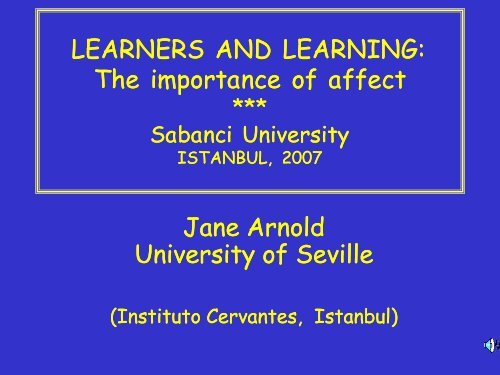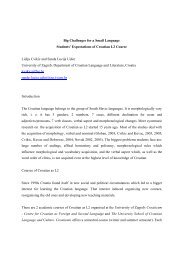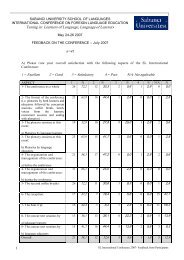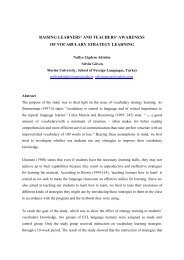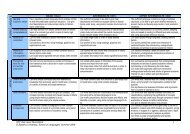Powerpoint
Powerpoint
Powerpoint
Create successful ePaper yourself
Turn your PDF publications into a flip-book with our unique Google optimized e-Paper software.
LEARNERS AND LEARNING:<br />
The importance of affect<br />
***<br />
Sabanci University<br />
ISTANBUL, 2007<br />
Jane Arnold<br />
University of Seville<br />
(Instituto Cervantes, Istanbul)
• FACT: Many students lack motivation, find classrooms<br />
irrelevant, make little process in learning, may not<br />
become useful memebers of society.<br />
• FACT: Many other students show enthusiasm in the<br />
classroom, learn the language well, take away from their<br />
classes very important life skills as well as language<br />
skills.<br />
***<br />
• FACT: Sometimes, no matter how hard we prepare our<br />
material, our classes are unsuccessful<br />
• FACT: Sometimes we can experience the magic of<br />
seeing deep and lasting learning going on in our classes
Affect refers to a wide range of<br />
phenomena that have to do with<br />
emotions, moods, dispositions<br />
and preferences.<br />
(Oatley and Jenkins)
The mind without affect<br />
isn’t really mind at all.<br />
(Joseph LeDoux)
The dinosaurs of the future will be<br />
those who try to live and work only<br />
from the head.<br />
Dr. Robert K. Cooper
The truth of the matter is that about<br />
99% of teaching is making students<br />
feel interested in the material.<br />
(Noam Chomsky)
Success in learning depends less on<br />
materials and tecniques and more on<br />
what goes on inside and between the<br />
people in the classroom. (Earl Stevick)<br />
• Success in learning depends less on<br />
things –and more on people – and the<br />
affective side of learning
Affect in language learning<br />
Individual factors<br />
Relational factors<br />
motivation<br />
crosscultural<br />
anxiety<br />
classroom<br />
learning styles<br />
selfconcept, selfesteem
cognitive<br />
affective<br />
physical
IN A PET SHOP<br />
A: You are the shop assistant<br />
B: You want to buy a tropical fish.<br />
Ask how much it costs, how to take<br />
care of it, etc.
CARACTERISTICS OF<br />
EFFECTIVE ACTIVITIES<br />
• They have personal meaning for students<br />
• They are examples of real communication<br />
• They take into account mind, emotions and<br />
the body<br />
• They offer choice<br />
• They facilitate good group dynamics
Technique is what the teacher<br />
uses….<br />
until the real teacher is there.<br />
(Parker Palmer)<br />
*****<br />
“To know” and “to do” is part of being a<br />
good teacher….<br />
but above all “to be”.
• Lecturer<br />
• Teacher<br />
• Facilitator<br />
knowledge of the language, of methods<br />
….and of ways to create a<br />
psychological atmosphere<br />
conducive to high quality learning<br />
It includes the consideration of what<br />
happens inside and between the<br />
people in the classroom.<br />
(Adrian Underhill)
After a class that didn’t go well, what<br />
do you do?<br />
• Complain to your colleagues<br />
• Get in a bad mood<br />
• Blame the weather, the students or… yourself<br />
• Eat chocolate<br />
Will any of these help you?<br />
What can help you?<br />
REFLECTION
LEARNING<br />
EXPERIENCE<br />
REFLECTION
Process of reflection<br />
• Think of a situation where things didn’t go<br />
very well.<br />
• Remember all the details about what<br />
happened and how you felt.<br />
• Investigate reasons for behaviors<br />
• Generate multiple explanations for what<br />
happened.<br />
• Decide what changes could be made so in<br />
future situations things could go better.
LANGUAGE OF EMPATHY<br />
Positive situations:<br />
How wonderful (exciting, nice…)!<br />
I’m really happy for you.<br />
Well done! Good job! Wow!<br />
Congratulations. That’s terrific!<br />
That’s the way to do it.<br />
You are really lucky.<br />
Negative situations:<br />
Oh, dear! That can’t be.<br />
Oh, no! What a problem!<br />
That’s too bad. I’m so sorry.<br />
What a pity! Poor you.<br />
How awful (terrible, dreadful, embarrassing…)!
A very good friend is coming to visit you.<br />
Your flat has been broken into again.<br />
Today is your birthday.<br />
Someone stole your wallet/handbag.<br />
You have just been given a 20% raise in salary.<br />
You have a terrible toothache.<br />
You’ve just won a free trip to anywhere you<br />
want to go.<br />
You lost your keys and can’t get in to your house.
Exchanged in ELT conversation<br />
class in Seville, Spain<br />
Teacher: Antonio, what did you do last<br />
weekend?<br />
Juan: I goed to a big party and met<br />
Shakira.<br />
Teacher: No, I went to a party.<br />
Carmen, what did you do last<br />
weekend?
To do:<br />
Active Listening<br />
• Empathize, don’t judge<br />
• Listen with attention to what the speaker<br />
is saying, to both the verbal and non<br />
verbal language.<br />
• Show interest and understanding<br />
• Stay with the speaker – don’t interrupt
Learning is first intermental – between<br />
minds that interact – and only later<br />
does it become intramental.<br />
(Vygotsky)
Group dynamics: study of the life<br />
and functioning of groups<br />
• Forming<br />
• Consolidating<br />
• Performing<br />
• Problemsolving<br />
• Ending
to live together as brothers…<br />
_______________________________<br />
as fools.<br />
________________________________<br />
or we will die together<br />
________________________________<br />
We must learn<br />
________________________________<br />
(Martin Luther King)
We must learn to live<br />
together as brothers….<br />
or we will die together<br />
as fools.<br />
(Martin Luther King)
We must learn to live<br />
together as brothers….<br />
or we will die together<br />
as fools.<br />
(Martin Luther King)
Group Dynamics and Language<br />
Learning: An affective matter.<br />
• Attentive, relaxed students learn<br />
better.<br />
• An emotionally secure atmosphere<br />
encourages students to speak.<br />
• For effective interaction it is important<br />
for students to get to know each other.<br />
• Group dynamics influences how we feel<br />
in the classroom and that influences<br />
what we learn.
Using only the textbook greatly limits your<br />
capacity to participate in innovative and<br />
creative teaching.<br />
Leo Van Lier
Multiple intelligences,<br />
multiple ways to learn
Little Red Riding Hood and the Wolf<br />
********<br />
Roald Dahl, Revolting Rhymes
Activating Mental Imagery<br />
• Having different<br />
sensory experiences<br />
without an external<br />
stimulus.<br />
• Seeing, hearing,<br />
touching, smelling,<br />
tasting in the mind<br />
(with the mind’s eye,<br />
the mind’s ear….)
It is impossible to think<br />
without mental pictures.<br />
Aristotle
I postulate images<br />
as the basis for<br />
mind.<br />
Antonio Damasio<br />
(winner of Prínce of Asturias<br />
Prize for science, 2005)
In language learning<br />
work with mental imagery can:<br />
• Increase learner’s cognitive skills, their<br />
memory and their creativity<br />
• Enhance their motivation<br />
• Strengthen their selfconcept<br />
• Help to focus their attention<br />
• Improve their reading and listening<br />
comprehension<br />
• Provide things they want to say when they<br />
speak or write
Paivio’s Dual Coding Theory and<br />
second language learning<br />
It is especially important to learn the second<br />
language in association with appropriate<br />
nonverbal referents – either visible or in<br />
imagery which represent the knowledge<br />
of the world.<br />
(Alan Paivio)
agaç
I consider the concept of the ideal self the<br />
most powerful and versatile motivational<br />
mechanism. When we think about our<br />
ideal self the attributes we would like to<br />
have , it helps us to formulate goals<br />
for our future and to reach them.<br />
Zoltan Dörnyei
Doug Brown’s Visualization Game<br />
Visualize yourself<br />
speaking the language<br />
fluently and<br />
interacting with<br />
people. Then when<br />
you are actually in<br />
such a situation, you<br />
will, in a sense, have<br />
been there before.
I ALWAYS HAVE SOMEONE TO<br />
TALK TO IN ENGLISH
• What was Sara wearing?<br />
• What happened when Michael<br />
came in?
© HELBLING LANGUAGES 2007
© HELBLING LANGUAGES 2007
© HELBLING LANGUAGES 2007
Positive Qualities<br />
POSITIVE QUALITIES<br />
love<br />
harmony<br />
beauty<br />
goodness<br />
compassion<br />
understanding<br />
confidence<br />
courage<br />
cooperation friendship<br />
determination order serenity<br />
happiness<br />
joy<br />
gratitude<br />
generosity<br />
light<br />
energy enthusiasm vitality<br />
humility<br />
patience<br />
loyalty<br />
freedom<br />
optimism<br />
peace<br />
wisdom
The end?
No, it’s only the beginning
We a ll crea te ma ny ima ges.<br />
Let´s tune in to the ones tha t ta ke us<br />
where we wa nt to go.
Tom: What did you use to do when you<br />
were a child?<br />
Mary: I used to play games with my sister.<br />
Did you play football when you were little?<br />
Tom: No, I lived in the country and there<br />
was no one to play with.<br />
Mary: When did you move to the city?<br />
Tom: We came here when I was 15. Did<br />
you live here when you were little?<br />
Mary: Yes, I did.
Tools<br />
questionnaires, video/audio tapes, interviews with<br />
students, student or teacher journals,<br />
conversations with colleagues<br />
You are worried about your students’<br />
attitudes towards English. You want to<br />
promote a positive feeling towards the<br />
language and you need to know what<br />
your students’ attitudes are.


